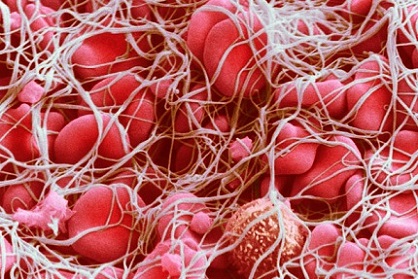COVID-19 Can Cause an Autoimmune-Related Blood Complication Known as Antiphospholipid Syndrome
Nikhil Prasad Fact checked by:Thailand Medical News Team Nov 09, 2024 1 year, 3 months, 2 weeks, 21 hours, 9 minutes ago
Medical News: Researchers at the General Hospital of the Southern Theatre Command of the Chinese People’s Liberation Army in Guangzhou and Kunming Medical University, China, have uncovered a rare and complex health issue in a COVID-19 patient. This report highlights a case where a 64-year-old man experienced severe symptoms linked to antiphospholipid syndrome (APS), an autoimmune disorder that impacts blood clotting. In this
Medical News report, the researchers detail the complex nature of APS, the connection with COVID-19, and the extensive treatment process involved in the patient's recovery.
 COVID-19 Can Cause an Autoimmune-Related Blood Complication Known
COVID-19 Can Cause an Autoimmune-Related Blood Complication Known
as Antiphospholipid Syndrome
Antiphospholipid Syndrome and COVID-19: An Unusual Connection
Antiphospholipid syndrome, or APS, is a disorder that causes blood clots due to abnormal immune responses, particularly in patients with high levels of antiphospholipid antibodies. Researchers previously observed some COVID-19 patients with elevated antiphospholipid antibody levels. However, diagnosing APS can be challenging, especially when symptoms and lab results can be fleeting. This case study explores how APS manifested after a COVID-19 infection and became a persistent condition requiring long-term monitoring.
Case Study: A Patient’s Journey Through Antiphospholipid Syndrome Following COVID-19
The subject of this case was hospitalized due to a severe COVID-19 infection, during which he exhibited classic symptoms of APS, including extreme blood clotting issues and organ dysfunction. Despite showing initial improvements with COVID-19 treatment, he returned to the emergency department within days of discharge with additional symptoms like low back pain, fatigue, and shortness of breath.
Upon his second hospital admission, further evaluations revealed an alarmingly low platelet count, anemia, and elevated creatinine levels, indicative of kidney problems. Tests identified high levels of specific antibodies - anticardiolipin and anti-β2 glycoprotein I - consistent with antiphospholipid syndrome. The patient’s case required intensive care, including blood transfusions and medication to stabilize blood counts.
Persistent APS Symptoms and Year-Long Monitoring
After initial stabilization, the patient’s antiphospholipid syndrome symptoms continued, including elevated levels of antiphospholipid antibodies. These antibodies can interfere with the normal function of blood vessels and lead to clotting, heart failure, and multi-organ issues. Researchers conducted regular blood tests every 12 weeks, discovering that the antibody levels remained high, which led to the recommendation of daily anticoagulation therapy with warfarin to prevent clotting.
Insights into Antiphospholipid Syndrome Pathogenesis
-Endothelial Cell Disruption: APS impacts endothelial cells, which line blood vessels and help prevent clotting.
APS patients have antibodies that interfere with a protective protein called annexin A5, disrupting the cells and increasing clotting risks.
-Signal Activation: The antibodies in antiphospholipid syndrome patients can also bind to receptors on endothelial cells, triggering inflammatory responses through signaling pathways that lead to clot formation.
-Reduced Fibrinolysis: The disorder interferes with the body’s ability to break down clots naturally, leading to high clotting potential.
-Platelet Activation: APS antibodies activate platelets, causing them to clump together, which adds to the risk of thrombosis in patients.
Treatment Strategies for Antiphospholipid Syndrome
Traditional APS treatment includes anticoagulants like warfarin, especially for patients with ongoing high antibody levels. This patient’s therapy involved anticoagulation management, with a targeted blood clotting measure known as the international normalized ratio (INR) kept between 2.0 and 3.0. In severe cases, more intense therapy is recommended. Other treatments, such as hydroxychloroquine and statins, have shown potential in managing APS by reducing inflammation and thrombosis risk. Immunomodulatory treatments, including corticosteroids, may also be used in cases where traditional anticoagulation alone is insufficient.
Emerging Treatments
-Hydroxychloroquine: Traditionally used in autoimmune conditions, it shows promise in reducing clotting risks in antiphospholipid syndrome.
-Statins: Known for their anti-inflammatory effects, statins help reduce the risk of clotting by controlling inflammatory factors.
These options, combined with conventional anticoagulation therapy, are emerging as comprehensive treatment approaches for APS.
Study Implications and Conclusion
The connection between COVID-19 and antiphospholipid syndrome, as illustrated in this case, underscores the importance of monitoring COVID-19 patients for autoimmune complications. This case reveals how COVID-19 could trigger or exacerbate antiphospholipid syndrome in predisposed individuals, although more studies are needed to confirm this link. For clinicians, the case provides valuable insights into the monitoring needs and treatment approaches for antiphospholipid syndrome when coupled with viral infections like COVID-19.
Antiphospholipid syndrome remains a complex and poorly understood syndrome that requires careful diagnosis and tailored treatment strategies. While further research could shed light on prevention and optimized care, this case reinforces the importance of long-term monitoring for antiphospholipid antibodies in COVID-19 patients.
The study findings were published in the peer-reviewed Thrombosis Journal.
https://link.springer.com/article/10.1186/s12959-024-00669-6
For the latest COVID-19 News, keep on logging to Thailand
Medical News.
Read Also:
https://www.thailandmedical.news/news/university-of-colorado-study-shows-that-ginger-supplementation-helps-in-autoimmune-diseases-as-it-suppresses-neutrophil-extracellular-trap-formation
https://www.thailandmedical.news/news/u-s-nih-study-finds-that-sars-cov-2-induced-antiphospholipid-antibodies-causes-endothelial-cell-activation-and-dysfunction-leading-to-severe-covid-19-
https://www.thailandmedical.news/news/covid-19-latest-university-of-michigan-and-nih-study-identifies-autoimmune-antibodies-as-new-cause-of-covid-19-blood-clots
